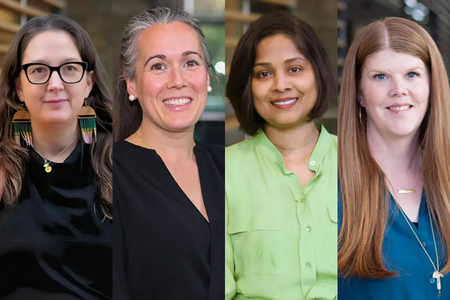
Drs. Sarah Funnell (Family Medicine), Alyson Mahar (Nursing), Madhuri Koti (Biomedical and Molecular Sciences), and Paula James (Medicine).
The Canadian Institutes of Health Research (CIHR), one of Canada's three federal funding agencies, recently announced a significant investment to support innovative and high-risk/reward health research. As part of the Spring 2024 Project Grant competition, CIHR is providing $325 million to support 373 research projects across the country. Queen's researchers have been awarded more than $2 million in this funding round to advance cutting-edge cancer treatments, improve end-of-life care, and enhance food sovereignty.
The Project Grant program is designed to support research with the greatest potential to advance knowledge, care, systems, and outcomes related to health. With this program, CIHR is seeking to fund the best ideas coming from new, incremental, innovative, and high-risk research exploration. Project Grants also provide specific priority funding for specialized areas of research with a focus on global health, Indigenous health and wellbeing, interdisciplinarity, or potential for commercialization.
Earlier this year, Queen's researcher Paula James (Medicine) received support from a similar priority CIHR fund. The Rare Disease Research Initiative provided Dr. James with $1.3 million as part of its goal to increase collaboration across the rare disease community and improve the lives of patients living with rare diseases and their families.
Learn more about the Queen's projects:
Food as medicine
Sarah Funnell's (Family Medicine) project "Food as Medicine: Enhancing Food Sovereignty and Promoting Healthy Aging for Indigenous Older Adults through Culturally Informed Food Programming in Long-Term Care Homes" has received $638,776. The project aims to address the ongoing lack of control over access to traditional and culturally-safe foods in long-term care homes for Indigenous Peoples. It is important for long-term care homes to offer culturally relevant foods so that Indigenous residents feel safe and welcome living there, and are able to see themselves, their history, and their culture in their care. Dr. Funnell's team will create roadmaps for long-term care homes to help them better serve Indigenous residents in hopes of supporting aging in line with Indigenous understandings of wholistic food, health, and wellbeing.
Cancer care
Alyson Mahar (Nursing) is leading a project to explore "End-of-Life Cancer Care Among Adults with Intellectual or Developmental Disabilities." Everyone should be able to take control of their cancer care when requiring good quality end-of-life care. However, many adults with intellectual or developmental disabilities (IDD) are not diagnosed with cancer until it is too late. Receiving $546,976 in funding, Dr. Mahar's study will collect data on health-care encounters to identify who is receiving good care among adults with IDD. Additionally, the team will explore the factors that lead to better or worse care and evaluate any differences in care among populations with and without intellectual or developmental disabilities.
Immunotherapy
Madhuri Koti's (Biomedical and Molecular Sciences) project "Targeting B Cell Exhaustion in BCG Non-Responsive Bladder Cancer" has received $975,376 in funding to advance targeted immunotherapy treatments. For more than 50 years, Bacillus Calmette Guérin (BCG) immunotherapy has been the standard immunotherapy treatment for bladder cancer. While BCG immunotherapy, delivered directly into the bladder, remains the poster child' among the most successful immunotherapies to treat cancer, it is not effective for many patients. There is also still a need for biomarkers for early identification of patients who will not benefit from this treatment. Dr. Koti's team is exploring the possibility to improve the response to BCG and reduce recurrence of cancer or progression to higher stages by combining the treatment with novel therapies.
Bleeding disorders
Paula James (Medicine) has received $1.3 million from CIHR's Rare Disease Research Initiative for her project exploring "Early Genomic Testing for Inherited Bleeding Disorders in Patients without a Diagnosis after First-Line Testing: A Randomized Controlled Trial." Many individuals, especially women, with abnormal bleeding, such as heavy menstrual periods, wait years to have their bleeding recognized medically and even longer to achieve a diagnosis - if one is ever made. Dr. James and her team aim to reduce the time to arrive at a bleeding disorder diagnosis by implementing genomic testing early in the work up. Her research is helping women identify red flag symptoms and working to reduce the barriers they face in getting an accurate and timely diagnosis and care.
To learn more about these and other CIHR-funded projects, visit CIHR's website.












